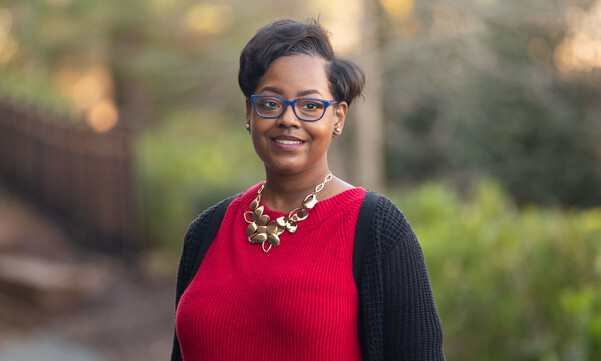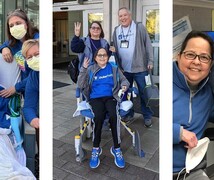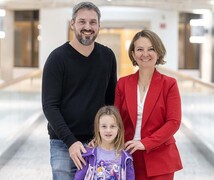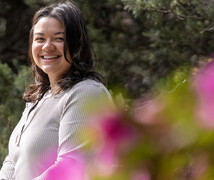Rodney White was no stranger to an active life. A former athlete, the 53-year-old enjoyed regular visits to the gym and mowing his lawn. So when a routine emergency drill at work left him breathless, he knew something was wrong.
The Long Road to Diagnosis
Soon after, he paid a visit to his primary doctor near his home in Kernersville, NC. The doctor suspected bronchitis, and because White’s mother and older brother both had asthma, he gave White a nebulizer to use when he felt short of breath. White stopped smoking and saw a cardiologist who found nothing wrong with his heart, but his condition continued to deteriorate. Eventually, he went to a local pulmonologist for a lung biopsy, which ruled out cancer. The pulmonologist told White, “There are a lot of tests I can do to find out what’s wrong, but I'm going to send you to Duke. They'll probably tell you in two days."
White and his wife Constance made the trip to Duke, where they met with pulmonologist Harvey Marshall, MD for a series of tests. Two days after his appointment, White learned he had pulmonary fibrosis in both lungs and that his only hope was a double (bilateral) lung transplant. “My heart dropped,” White remembered, “but I realized I wanted to live, and I said, ‘Okay, we’re going to do this.’"
A Mutual Commitment
At Duke, becoming a candidate for lung transplant is serious business. It not only requires an extensive evaluation with multiple members of the lung transplant team, but also a lifetime commitment to staying healthy. White’s transplant surgeon, Matthew Hartwig, MD, explained. “Our program puts a lot of focus on preparing people to take care of themselves after transplant and making sure that they've got the tools and resources to be successful. When we accept a patient into our program, it's a mutual, lifelong commitment to each other.”
White took this commitment seriously. While he was approved for a lung transplant, he had work to do before his name could be added to the national waitlist for donor lungs. Although he was dependent on oxygen and some days felt too weak to even brush his teeth, he completed 23 sessions of pulmonary rehabilitation near his home. He changed his diet, stopped drinking alcohol, and took his medications on a strict schedule. When he was strong enough, he and his wife relocated to Durham, where he took part in 23 additional sessions through the Duke pulmonary rehabilitation program. Two weeks later after he was placed on the waitlist, he received a call that donor lungs had been matched to him.
A Little Luck and a Lot of Gratitude
According to Dr. Hartwig, White’s surgery went well from start to finish. “He was very fortunate that a perfect set of lungs became available for him in such a relatively short period of time and that the lungs functioned well as soon as they were transplanted.”
White does not take his experience for granted and credits his wife -- “my rock” -- with her commitment to his journey. “And I can't say enough for the people at the hospital and at the clinics. They just don't get enough credit -- the dieticians, housekeepers, the nurses’ assistants, the nurses, and my transplant coordinator. The doctors are not the only ones who saved my life. There were other people who helped me through.”
White was equally grateful to his donor. Families of deceased organ donors can choose to remain anonymous, but when the mother of White’s donor contacted him, he did not hesitate to respond. “If you get that call from the donor's family, you're doing them a service by going to meet them or calling them on the phone.” He and his wife have visited them in Florida on several occasions. “I am like their brother now.”
Seven Years and Going Strong
White, now 61, recently celebrated his seventh year with new lungs. Although he has retired from a long career as a supervisor at a senior living community, he stays busy. He cooks and exercises -- either on his treadmill or outdoors -- every day, and he is back to mowing the lawn. “I'm seven years in, and I feel great. I still have to do the same things that got me here. I don't play around with my medicine. I eat right, exercise, and watch my sweets, and it's not easy. But you have to want to live. If you want to live, you'll be right here just like I am.”




